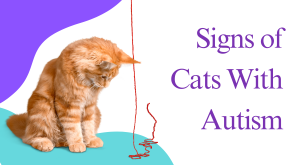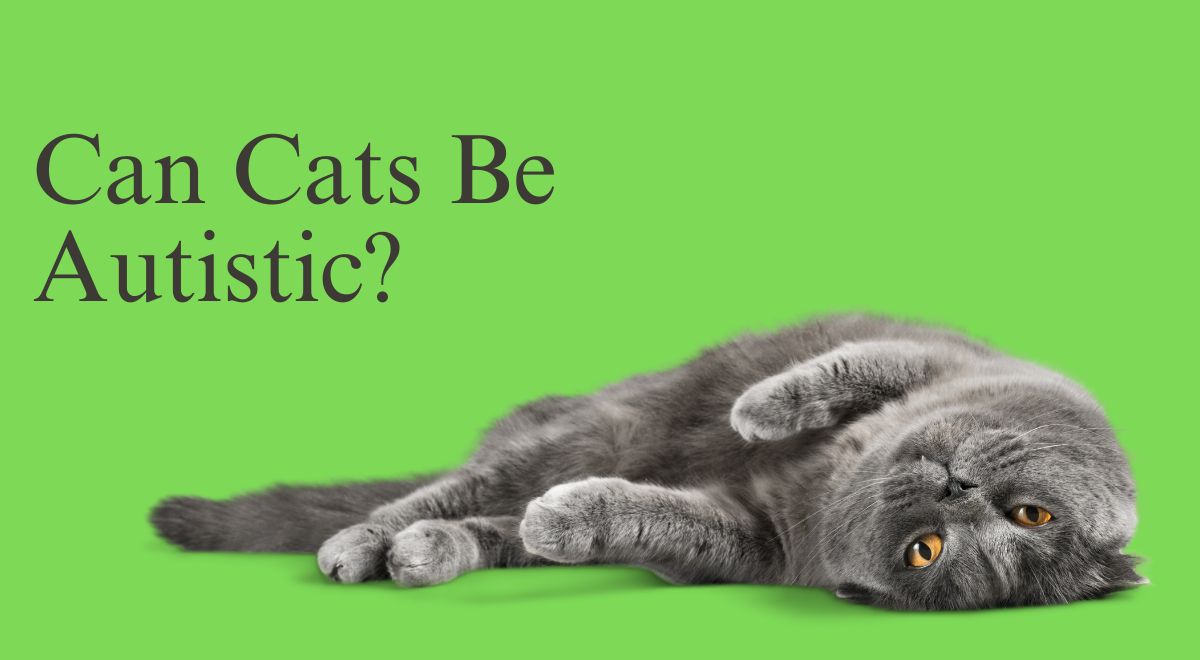Can Cats Be Autistic? Signs & Symptoms
Autism is a widely recognised and studied condition in humans, but the concept of autism in cats is less clear. Many cat owners observe behaviours in their pets that seem unusual or different from others, leading them to wonder, “Can cats be autistic?” This blog post explores this question in depth, examining signs of autism-like behaviour in cats, potential causes, and what you can do to support a cat exhibiting these behaviours.
Understanding Autism in Cats
The term “autism” describes a spectrum of disorders characterised by challenges with social interaction, communication, and repetitive behaviours. While autism is a well-defined condition in humans, it’s important to note that it is not officially recognised in veterinary medicine for cats. However, many pet owners and veterinarians observe behaviours in cats that seem to mirror autism-like symptoms.
Signs of Cats With Autism
If you are wondering whether your cat might exhibit autism-like behaviour, here are some signs to look out for:

Social Interaction Issues
Cats that appear to have autism-like behaviours may struggle with social interactions. They might prefer to be alone, avoid contact with other animals or humans, and show little interest in typical cat activities like playing or grooming each other.
Repetitive Behaviors
Repetitive behaviours are a hallmark of autism in humans and can also be seen in cats. These behaviours can include repetitive grooming, pacing, or engaging in the same activity for extended periods without apparent purpose.
Sensitivity to Changes
Cats with autism-like behaviours may be susceptible to changes in their environment. They might become anxious or distressed when exposed to new furniture, different routines, or unfamiliar people.
Communication Difficulties
Communication issues can manifest in a lack of typical cat vocalisations or body language. Such cats might not meow often or might not respond to their names or commands.
Unusual Reactions to Stimuli
These cats may react unusually to light, sound, or touch stimuli. For instance, they might become excessively startled by everyday noises or dislike being petted.
What Should We Do For a Cat With Autism?
If you suspect your cat is exhibiting autism-like behaviours, there are several steps you can take to support them and improve their quality of life.
Create a Stable Environment
Maintaining a consistent and stable environment can help reduce anxiety and stress for your cat. Keep changes to a minimum and introduce new things gradually.
Provide Enrichment
Enrichment activities are crucial for all cats, especially those with autism-like behaviours. Provide toys, scratching posts, and interactive play to stimulate their minds and keep them engaged.
Establish Routine
Cats thrive on routine. Regular feeding times, playtimes, and sleep schedules can help your cat feel more secure and reduce stress.
Monitor Their Health
Regular vet check-ups are essential to ensure your cat’s overall health. Discuss your observations with your vet, as some behaviours might be linked to underlying health issues.
Use Calming Products
Calming products such as pheromone diffusers, calming collars, or supplements can help reduce anxiety and create a more peaceful environment for your cat.
What Are the Main Causes of Autism in Cats, and How Can We Overcome These?
Understanding the causes of autism-like behaviours in cats can help manage and possibly mitigate these behaviours.
Genetic Factors
Genetics can play a role in the development of certain behaviours in cats. While there is no specific gene linked to autism in cats, some breeds may be more predisposed to behaviours that seem autism-like.
Early Life Experiences
Kittens who do not receive adequate socialisation during their early weeks may exhibit behaviours similar to autism. Ensuring that kittens have positive interactions with humans and other animals early on can help prevent these issues.
Health Issues
Some health problems, such as neurological disorders, can manifest as behaviours that resemble autism. Regular veterinary care and early detection of health issues are crucial in managing these behaviours.
Environmental Factors
A stressful or unstable environment can contribute to the development of anxiety and unusual behaviours in cats. Providing a calm and stable home can help mitigate these effects.
Lack of Stimulation
Cats that are not adequately stimulated may develop repetitive or unusual behaviours out of boredom. Providing enrichment and interactive play can help reduce these behaviours.
Conclusion
While the question “Can cats be autistic?” remains a topic of debate, it’s clear that some cats exhibit behaviours that are reminiscent of autism in humans. By understanding the signs of autism-like behaviours, providing a stable and enriching environment, and seeking regular veterinary care, you can support your cat in leading a happy and healthy life. For more insights on pet care and cat health, explore other articles on blogwave.info.
FAQs
Can cats be officially diagnosed with autism?
No, autism is not an officially recognised condition in cats. However, some cats exhibit behaviours that are similar to autism in humans.
What should I do if my cat shows autism-like behaviours?
Provide a stable environment, offer enrichment activities, establish a routine, monitor their health, and consider using calming products. Consult your veterinarian for personalised advice.
Are certain cat breeds more prone to autism-like behaviours?
While no specific breeds are identified as being more prone to autism, some cats may have genetic predispositions to certain behaviours.
Can early socialisation prevent autism-like behaviours in cats?
Proper socialisation during a kitten’s early weeks can help prevent behaviours that resemble autism. Positive interactions with humans and other animals are crucial.
What are some common health issues that can cause autism-like behaviours in cats?
Neurological disorders and other health issues can manifest as behaviours similar to autism. Regular veterinary care is essential for early detection and management.



